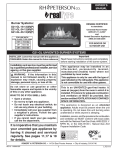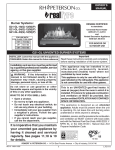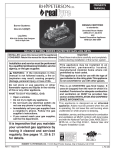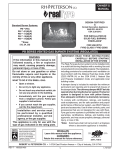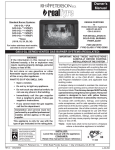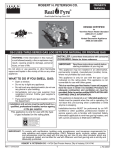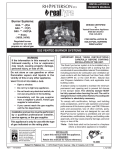Download R.H. Peterson G21-GL-30C-12(P) Owner`s manual
Transcript
OWNER’S MANUAL DESIGN CERTIFIED Burner Systems: to Vented Decorative Appliance ANSI Z21.60b-2004 CSA 2.26b-2004 G21-GL-18C-12(M)(P) G21-GL-24C-12(M)(P) G21-GL-30C-12(M)(P) FOR INSTALLATION IN SOLID-FUEL BURNING FIREPLACES* FOR USE WITH FYRE GLASS / FYRE GEMS 18" 7.5 lbs 24" 10.0 lbs 30" 15.0 lbs FOR INDOOR OR OUTDOOR USE G21-GL VENTED BURNER SYSTEMS IMPORTANT: READ THESE INSTRUCTIONS CAREFULLY BEFORE STARTING INSTALLATION OF THE LOG SET WARNING If the information in this manual is not followed exactly, a fire or explosion may result, causing property damage, personal injury, or loss of life. The Real-Fyre gas log set is to be installed only in a solid-fuel burning fireplace with a working flue and constructed of noncombustible material.The installation, including provisions for combustion and ventilation air must conform with the National Fuel Gas Code, ANSI Z223.1/NFPA 54, or the CSA B149.1, Natural Gas and Propane Installation Code, and applicable local building codes. A damper clamp is included to maintain the minimum permanent vent opening and to prevent full closure of the damper blade. The chimney damper MUST be fully opened when burning the log set.The log set is designed to burn with yellow flames; thus adequate ventilation is absolutely necessary. To comply with certification, listings, and building code acceptances, and for safe operation and proper performance of this log set, use ONLY Peterson parts and accessories. Use of other controls, parts, and accessories that are not designed for use with Real-Fyre gas log sets is prohibited and will void all warranties, certifications, listings, and building code approvals, and may cause property damage, personal injury, or loss of life. *Note: Solid-fuels shall not be burned in a fireplace where a decorative appliance is installed. Do not store or use gasoline or other flammable vapors and liquids in the vicinity of this or any other appliance. WHAT TO DO IF YOU SMELL GAS: • Open a window. • Do not try to light any appliance. • Do not touch any electrical switch; do not use any phone in the building. • Immediately call the gas supplier from a neighbor’s phone. Follow gas supplier’s instructions. • If you cannot reach the gas supplier, call the fire department. Installation and service must be performed by a qualified professional installer, service agency, or the gas supplier. This appliance is only for use with the type of gas indicated on the rating plate. INSTALLER: Leave this manual with the appliance. CONSUMER: Retain this manual for future reference. 10-104 Robert H. Peterson Co. • 14724 East Proctor Avenue • City of Industry, CA 91746 REV 2- 1105051552 1 L-A2-312 MANUEL DU PROPRIÉTAIRE CONCEPTION CERTIFIÉE Systèmes De Brûleur: à Vented Decorative Appliance ANSI Z21.60b-2004 CSA 2.26b-2004 G21-GL-18C-12(M)(P) G21-GL-24C-12(M)(P) G21-GL-30C-12(M)(P) POUR L’INSTALLATION EN CHEMINÉES BRÛLANTES DE COMBUSTIBLE SOLIDE* POUR L'USAGE AVEC FYRE GLASS / FYRE GEMS 18" 7.5 lbs 24" 10.0 lbs 30" 15.0 lbs POUR L'USAGE D'INTÉRIEUR OU EXTÉRIEUR G21-GL SYSTÈMES EXHALÉS DE BRÛLEUR IMPORTANT: L I S E Z C E S I N S T RU C T I O N S SOIGNEUSEMENT AVANT DE COMMENCER L'INSTALLATION DE L'ENSEMBLE DE NOTATION. L'ensemble de notation de gaz d'Real-Fyre doit être installée seulement dans une cheminée brûlante de combustible solide avec une conduite de cheminée fonctionnante et être construit avec du matériel noncombustible. L'installation, y compris des dispositions pour l'air de combustion et de ventilation doit se conformer au code national de gaz de carburant, la norme ANSI Z223.1/NFPA 54, ou le CSA B149.1, code d'installation de gaz naturel et de propane, et codes du bâtiment locaux applicables. Une bride plus humide est incluse pour maintenir l’ouverture permanente minimum de passage et pour empêcher la pleine fermeture de la lame plus humide. L’amortisseur de cheminée DOIT être entièrement ouvert en brûlant la notation réglée. L’ensemble de notation est conçu pour brûler avec les flammes jaunes; ainsi à ventilation proportionnée est absolument nécessaire. Pour se conformer à la certification, les listes, et les acceptations de codes du bâtiment, et pour l'exploitation sûre et l'exécution appropriée de cet ensemble de notation, utilisent SEULEMENT des pièces et des accessoires d'Peterson. L'utilisation d'autres commandes, pièces, et accessoires qui ne sont pas conçus pour l'usage avec des ensembles de notation de gaz d'Real-Fyre est interdite et videra toutes les garanties, certifications, listes, et approbations de codes du bâtiment, et peut causer des dégats matériels, le dommage corporel, ou des pertes humaines. *Note: des Plein-carburants ne seront pas brûlés dans une cheminée où un appareil décoratif est installé. AVERTISSEMENT Si l’information en ce manuel n’est pas suivie exactement, une incendie ou une explosion peut résulter, entraînant des dégats matériels, des blessures, ou la perte de la vie. Ne stockez pas ou n’employez pas l’essence ou d’autres vapeurs et liquides inflammables à proximité de ceci ou d’aucun autre appareil. CE QUI À FAIRE SI VOUS SENTEZ LE GAZ: • Ouvrez une fenêtre. • N’essayez pas de n’allumer aucun appareil. • Ne touchez aucun commutateur électrique; n’utilisez aucun téléphone dans le bâtiment. • Appelez immédiatement le fournisseur de gaz du téléphone du voisin. Suivez les instructions du fournisseur de gaz. • Si vous ne pouvez pas atteindre le fo u r n i s s e u r d e g a z , a p p e l e z l e département de feu. L’installation et le service doivent être assurés par un installateur qualifié et professionnel, l’agence de service, ou le fournisseur de gaz. Cet appareil sert seulement avec le type de gaz indiqué de la plaque de contrôle. INSTALLATEUR : Laissez ce manuel avec l'appareil. CONSOMMATEUR: Maintenez ce manuel pour la future référence. 10-104 Robert H. Peterson Co. • 14724 East Proctor Avenue • City of Industry, CA 91746 REV 2- 1105051552 2 L-A2-312 TABLE OF CONTENTS 5 IMPORTANT PRE-INSTALLATION AND FIREPLACE SAFETY INFORMATION 6 SPECIFICATIONS 6 DAMPER CLAMP INSTRUCTIONS 7 BURNER PARTS LIST 8 BURNER INSTALLATION 9 REMOTE SYSTEM (if equipped) 9 CONTROL SETTINGS 10 DECORATIVE MEDIA PLACEMENT 10 GLASS/GEMS PLACEMENT (purchased separately) 10 DECORATIVE MEDIA ON FIREPLACE FLOOR (Optional) 11 CLEANING AND SERVICING SAFETY INFORMATION 12 CLEANING AND SERVICING 12 TO CLEAN THE BURNER SYSTEM 12 CLEANING AND SERVICING THE ODS PILOT 13 OPERATING THE BURNER SYSTEM 13 CHECKING THE ODS PILOT FLAME APPEARANCE 14 LIGHTING INSTRUCTIONS - SERIES 12 VALVE 15 TROUBLESHOOTING 18 WARRANTY REV 2- 1105051552 3 L-A2-312 L'INFORMATION DE SÛRETÉ IMPORTANTE DE PRÉINSTALLATION ET DE CHEMINÉE ATTENTION: L'installation et la réparation doivent être faites par un NFI certifié ou tout autre installateur professionnel qualifié. Installateur: Lisez soigneusement ces instructions avant d'installer ce système de brûleur à gaz. Soyez sûr que vous comprenez tous les mesures de sécurité et avertissements contenus en ce manuel. A. Cet appareil est conçu comme appareil occupé. Les adultes doivent être présent quand cet appareil à gaz fonctionne. Ne laissez pas ce burning d'unité si sans surveillance ou tandis que n'importe qui dort. B. Cet appareil sert seulement avec le type de gaz indiqué de la plaque de contrôle. Cet appareil n'est pas CONVERTIBLE de CHAMP pour l'usage avec d'autres gaz. C. FAITES ATTENTION: Sinon installé, entretenu, et utilisé correctement par ces instructions, ce produit peut causer le dommage corporel, les dégats matériels, ou les pertes humaines sérieux. D. AVERTISSEMENT: Avant l'installation dans une cheminée plein-carburant-brûlante, la conduite de cheminée, l'amortisseur, et le foyer de cheminée doivent ÊTRE COMPLÈTEMENT NETTOYÉS de la suie, de la créosote, des cendres, et de la peinture lâche, et doivent être inspectés par un décapant qualifié de cheminée. Quelques cheminées plus anciennes peuvent ont besoin de réparation avant d'installer cet appareil. E. VÉRIFIEZ LE TYPE de GAZ (normal ou propane) : La fourniture de gaz doit être identique qu'indiquée de votre plaque de contrôle de système de brûleur. Si la fourniture de gaz est différente, N'INSTALLEZ PAS. Contactez votre revendeur pour l'aide immédiate. F. Gardez le domaine du clair réglé de notation de gaz et libérez des matériaux combustibles, l'essence, et d'autres vapeurs et liquides inflammables. G. LA PRESSION DE GAZ INSUFFISANTE GARDERA LE PILOTE DU FONCTIONNEMENT CORRECTEMENT (SI ÉQUIPÉ). N'EMPLOYEZ PAS SI LA PRESSION DE GAZ EST INFÉRIEURE À LA CONDITION MINIMUM. H. L'admission minimum gaz-fournissent la pression aux fins de l'ajustement d'entrée est 5" ; colonne d'eau (w.c.) sur le gaz naturel et le 11" ; w.c. sur le gaz de propane. La pression de gaz insuffisante affectera l'opération appropriée du pilote (si équipé). N'installez pas cet appareil à gaz si la pression minimum n'est pas disponible. L'admission maximum gaz-fournissent la pression est 10.5" ; w.c. sur le gaz naturel et le 13" ; w.c. sur le gaz de propane. La source de propane doit être réglée. (Ne reliez pas cet appareil directement à un réservoir de gaz non réglé de propane - ceci peut causer une explosion.) I. Le système sifflant de gaz doit être classé pour fournir la pression d'admission minimum au débit maximum (BTU/hr). La perte de pression anormale se produira si la pipe est trop petite, ou la course est trop longue. La pipe de fourniture de gaz doit être 1/2" ; diamètre intérieur minimum. Si la ligne de gaz est plus longue que 20' ; une ligne de plus grand diamètre peut être nécessaire. J. Les estimations d'entrée montrées en Btu par heure sont pour des altitudes jusqu'à 2.000 pi. Pour des altitudes audessus de 2.000 pi, référez-vous au code national de gaz de carburant ou entrez en contact avec le fabricant avant d'installer ce produit. K. Cet appareil à gaz et son clapet à gaz principal doivent être disconnected du gaz-fournissent le système sifflant pendant tout vérificateur de pression de ce système aux pressions d'essai au-dessus de 1/2 psig. L. Cet appareil à gaz doit être isolé dans gaz-fournissent le système sifflant en fermant le robinet d'isolement d'équipement relié au gaz-fournissent la ligne pendant tout vérificateur de pression du gaz-fournissent le système sifflant aux pressions d'essai égales à ou moins d'à 1/2 psig. M. N'employez pas cet appareil si n'importe quelle partie a été sous-marine. Appelez immédiatement un technicien qualifié de service pour inspecter l'appareil et pour remplacer n'importe quelle partie du système de contrôle et de n'importe quelle commande de gaz qui a été sous-marine. N. Una pantalla de la chimenea debe ser en el lugar cuando el sistema está quemando. Las provisiones para el aire de combustión adecuado deben ser mantenidas. A menos que otras provisiones para el aire de combustión se proporcionen, la pantalla tendrá una abertura para la introducción de aire de combustión. El aire de combustión es adecuado cuando todas las llamas se encrespan en la chimenea y lejos de la pantalla. Cuando se utiliza un recinto de cristal de la chimenea (puerta), deje las puertas completamente abiertas cuando el sistema es en funcionamiento. O. Cet appareil peut être installé dans un marché des accessoires, maison (mobile) de manière permanente située et manufacturée, où non interdit par des codes locaux. L'installation des appareils a conçu pour la maison manufacturée (États-Unis seulement) ou installation de caravane résidentielle doit se conformer au CAN/CSA standard Z240 MH, logement mobile, au Canada, ou à la construction et au standard de sécurité à la maison manufacturés, intitulent 24 CFR, la partie 3280, aux Etats-Unis, ou quand une telle norme ne s'applique pas, à ANSI/NCSBCS A225.1/NFPA 501A, installations à la maison manufacturées standard. 4 IMPORTANT PRE-INSTALLATION AND FIREPLACE SAFETY INFORMATION CAUTION: Installation and repair must be done by an NFI Certified or other qualified professional installer. Installer: Carefully read these instructions before installing this gas burner system. Be sure you understand all safety precautions and warnings contained in this manual. A. This appliance is designed as an attended appliance. Adults must be present when this gas appliance is operating. Do not leave this unit burning when unattended or while anyone is sleeping. B. This appliance is only for use with the type of gas indicated on the rating plate. This appliance is NOT FIELD CONVERTIBLE for use with other gasses. C. BE CAREFUL: If not installed, serviced, and used correctly per these instructions, this product can cause serious personal injury, property damage, or loss of life. D. WARNING: Before installing in a solid-fuel-burning fireplace, the chimney flue, damper, and firebox must be thoroughly CLEANED of soot, creosote, ashes, and loose paint, and must be inspected by a qualified chimney cleaner. Some older fireplaces may need repair prior to installing this appliance. E. CHECK GAS TYPE (natural or propane): The gas supply must be the same as stated on your burner system rating plate. If gas supply is different, DO NOT INSTALL. Contact your dealer for immediate assistance. F. Keep the area of the gas burner system clear and free from combustible materials, gasoline, and other flammable vapors and liquids. G. INSUFFICIENT GAS PRESSURE WILL KEEP THE PILOT (IF EQUIPPED) FROM OPERATING PROPERLY. DO NOT USE IF GAS PRESSURE IS LOWER THAN THE MINIMUM REQUIREMENT. H. The minimum inlet gas-supply pressure for purposes of input adjustment is 5" water column (w.c.) on natural gas and 11" w.c. on propane gas. Insufficient gas pressure will affect proper operation of the pilot (if equipped). Do not install this gas appliance if minimum pressure is not available. The maximum inlet gas-supply pressure is 10.5" w.c. on natural gas and 13" w.c. on propane gas. The propane source must be regulated. (Do not connect this appliance directly to an unregulated propane gas tank - this can cause an explosion.) I. The gas piping system must be sized to provide minimum inlet pressure at the maximum flow rate (BTU/hr). Undue pressure loss will occur if the pipe is too small, or the run is too long. Gas supply pipe must be 1/2" minimum interior diameter. If the gas line is longer than 20', a larger diameter line may be necessary. J. Input ratings shown in BTU per hour are for elevations up to 2,000 ft. For elevations above 2,000 ft., refer to the National Fuel Gas Code or contact manufacturer before installing this product. K. This gas appliance and its main gas valve must be disconnected from the gas-supply piping system during any pressure testing of that system at test pressures in excess of 1/2 psig. L. This gas appliance must be isolated from the gas-supply piping system by closing the equipment shutoff valve connected to the gas-supply line during any pressure testing of the gas-supply piping system at test pressures equal to or less than 1/2 psig. M. Do not use this appliance if any part has been underwater. Immediately call a qualified service technician to inspect the appliance and to replace any part of the control system and any gas control that has been underwater. N. A fireplace screen must be in place when the system is burning. Provisions for adequate combustion air must be maintained. Unless other provisions for combustion air are provided, the screen shall have an opening(s) for introduction of combustion air. Combustion air is adequate when all flames curl into the fireplace and away from the screen. When a glass fireplace enclosure (door) is used, leave the doors fully open when the system is in operation. O. This appliance may be installed in an aftermarket, permanently located, manufactured (mobile) home, where not prohibited by local codes. Installation of appliances designed for manufactured home (U.S. only) or mobile home installation must conform with the Standard CAN/CSA Z240 MH, Mobile Housing, in Canada, or with the Manufactured Home Construction and Safety Standard, Title 24 CFR, Part 3280, in the United States, or when such a standard is not applicable, ANSI/NCSBCS A225.1/NFPA 501A, Manufactured Home Installations Standard. 5 SPECIFICATIONS Real-Fyre gas log sets must be installed only in a wood burning fireplace with the minimum firebox dimensions and venting requirements met (see table on this page). This appliance is designed to burn with yellow flames; adequate ventilation is absolutely necessary. Minimum Fireplace Size Burner Model Width BTU Rating Depth Height Natural Gas Propane Gas 16" 10" 15" 30k 27k 28" 21" 11" 15" 35k 30k 34" 28" 11" 15" 40k 35k Front Rear G21-GL-18C-12(M)(P) 22" G21-GL-24C-12 (M)(P) G21-GL-30C-12 (M)(P) Note: Rear width is at corresponding depth. Minimum permanent free opening area of chimney damper for venting (sq. in.) For factory-built fireplaces For masonry-built fireplaces Chimney height 18" 24" 30" 18" 24" 30" 15' 19 22 25 23 26 29 20' 17 20 23 21 24 27 25' 16 19 22 -- -- -- 30' 15 18 20 19 22 24 Note: The minimum chimney height from hearth to top of chimney is 15'. DAMPER CLAMP INSTRUCTIONS The damper clamp with hex bolt (Fig. 6-2) is provided as a means to prevent full closure of the damper blade. The clamp is easily attached to most damper blades with pliers or a wrench, and must be permanently installed. The clamp is designed to prevent accidental closure of the damper when installed as illustrated (Fig. 6-3 and Fig. 6-4). Should the clamp not fit, or fail to provide the permanent vent opening listed in the table found above, have a permanent stop installed, remove the damper blade, or have the damper cut to provide the minimum permanent Set screw opening required. Note: These are minimum damper opening specifications. The damper must be completely opened when operating this gas appliance to achieve the best ventilation possible. Damper clamp Fig. 6-2 6 Open Closed Fig. 6-3 Fig. 6-4 BURNER PARTS LIST Note: Photos not to scale 4 2 ODS pilot assembly 1 8 24" Model Shown 5 7 6 9 Bottom view 10 3 Replacement parts can be ordered from your local Real-Fyre dealer. Control valve (w/ reflector removed) 18" model Item 24" model 30" model Description Part No. Qty. Part No. Qty. Part No. Qty. 1. Burner assembly (w/ venturi tube) GG21-18 1 GG21-24 1 GG21-30 1 2. or ODS pilot assembly (natural) ODS pilot assembly (propane) ODS-0003 ODS-0004 1 1 ODS-0003 ODS-0004 1 1 ODS-0003 ODS-0004 1 1 3. or Control valve (natural) Control valve (propane) SV-8 SV-8P 1 1 SV-8 SV-8P 1 1 SV-8 SV-8P 1 1 4. Reflective rear panel G21-02-18 1 G21-02-24 1 G21-02-30 1 5. Reflective front cover (removable, shown installed) G21-03-18 G21-03 1 G21-03-24 G21-03 1 G21-03-30 G21-03 1 6. Piezo igniter P2-1 1 P2-1 1 P2-1 1 7. On/Off switch SW-9 1 SW-9 1 SW-9 1 8. 30" flex connector (w/ adapter) CK-10 1 CK-10 1 CK-10 1 9. Remote kit (if equipped) RR-1A 1 RR-1A 1 RR-1A 1 10. Damper clamp DC-1 1 DC-1 1 DC-1 1 Glass/gems are purchased & packaged separately. Amount varies depending on model size; 18" 7.5 lbs 24" 10.0 lbs 30" 15.0 lbs Glass/gems are available in 7.5 or 10 lb bags, in various colors; contact your dealer for further details. 7 BURNER INSTALLATION The Real-Fyre gas log set must be installed by a qualified professional service technician. Instructions must be followed carefully to ensure proper performance and full benefit from the gas log set. Check to be sure the log set is designed and labeled for the type of gas (natural or propane gas) supplied to the fireplace. Fireplace floor must be level, clean, and smooth. WARNING: Failure to position the parts in accordance with these diagrams or failure to use only parts specifically approved with this appliance may result in property damage or personal injury. REFER TO THE BURNER PARTS LIST WHEN FOLLOWING THESE INSTRUCTIONS. 1. MAKE SURE THE FIREPLACE GAS SUPPLY IS TURNED OFF. Flex connector Adapter 2. Locate the gas-supply stub inside the fireplace and remove the cap, if attached (reference Fig. 8-1). CAUTION: When removing the cap, make sure the stub does not turn, loosening the connection inside the wall. 3. Place the burner system in the fireplace. Center the burner in the fireplace. (Reference Fig. 8-2 for orientation.) Gas supply stub Fig. 8-1 Connect gas supply 4. Be sure gas to the fireplace is off. Remove the adapter that is loosely connected to the flex connector (coming off of the burner system). Attach the adapter to the gas-supply stub using a pipe compound resistant to all gasses.Tighten securely. Then attach the open end of the flex connector to the adapter. Tighten securely. (See Fig. 8-1.) 5. LEAK TEST: Turn on the fireplace gas supply, and test at all connections for leaks using the appropriate soapy water solution. If bubbles appear, a leak is present. Turn off the gas and tighten at all connections. Repeat until no leaks are present. If a leak persists, turn off the gas supply and contact the local gas company or dealer. NEVER USE A FLAME TO CHECK FOR LEAKS. Fig. 8-2 Overall orientation (24" shown) 6. Using the appropriate hardware for your fireplace construction (not included); secure the burner system into the fireplace floor. The unit has two anchoring tabs, reference Fig. 8-3. 7. Remove the protective coating off of the reflective rear panel and front cover. DO NOT use a sharp object to remove coating. Install the front cover onto the front of the burner system (see Fig. 8-4). Fig. 8-3 Anchoring tab close up Turn off the gas supply prior to proceeding. Fig. 8-4 Front cover installed 8 BURNER INSTALLATION (cont.) REMOTE SYSTEM (if equipped) OFF PILOT ON If the unit is equipped with a remote; read and follow the separate instructions (packed with the remote) for complete remote installation. CONTROL SETTINGS We recommend that before you install the decorative media, you familiarize yourself with the control valve layout. This will help you to be confident operating the burner system when fully installed. See Fig. 9-1 for typical control positions. Read settings here Fig. 9-1 Control valve operating positions IMPORTANT For all valves, the air MUST be purged from the gas line before the pilot will light and burn properly. The time needed to purge will depend on the length of the gas line to the unit and the amount of time since the unit or gas line was last used. It may take several minutes before all the air is purged and the pilot will light and burn properly. Reference the LIGHTING INSTRUCTIONS section in this manual. 9 DECORATIVE MEDIA PLACEMENT GLASS/GEMS PLACEMENT (purchased separately) CAUTION: Glass pieces may have sharp edges. Be careful handling the glass. Use hand protection, such as gloves, if necessary. (Gems shown in burner) Glass / gems (purchased separately) must be installed on the burner for the system to operate properly. See the table below for correct amounts of media for each model. Glass / gems are available in various colors; contact your dealer for further details. Pour the glass / gems directly on top of the burner so that the burner pan is covered completely and evenly (see Fig. 10-1). Model Size Correct Amount of Fyre Glass/Gems to Use 18" 24" 30" 7.5 lbs 10.0 lbs 15.0 lbs Fig. 10-1 Glass / gems placement (Glass shown on floor) Important: When installing glass on your burner; DO NOT use the fine glass particles that have settled at the bottom of the glass bag. These particles will adversely affect the flame pattern. Fig. 10-2 Decorative media floor placement Important: Do not add any additional glass/gems to this burner system. Any additional glass/gems may cause unsafe operation. WARNING: All previously applied loose material must be removed prior to reapplication. All replacement loose material must be purchased from the R.H. Peterson Co. DECORATIVE MEDIA ON FIREPLACE FLOOR (Optional) Glass, gems, or Lava-Fyre Granules may be placed on the fireplace floor as an enhancement to the burner system. If purchased; spread the decorative media on the floor of the fireplace, around the front and sides of the burner system. See Fig. 10-2 for an example (reflective black glass shown). CAUTION: DO NOT place any of this additional media into or onto the burner system, or behind it. CAUTION: BURN HAZARD. GLASS AND/OR GEMS ON BURNER SYSTEM WILL REMAIN HOT FOR SOME TIME AFTER USE. You must maintain the placement as shown to ensure proper operation of the burner system. If you need to reposition any media to maintain the proper layout, use heat-resistant gloves or allow media adequate time to cool before handling. 10 CLEANING AND SERVICING SAFETY INFORMATION Note: Regular cleaning and servicing will be necessary to ensure proper ODS pilot operation and proper burn characteristics. 1. Always shut off the gas to the burner system while performing service work. 2. Allow the burner system to cool before servicing. 3. Installation, service, and repair must be done by an NFI Certified or other qualified professional service technician. The appliance MUST be inspected before use, and cleaned at least annually to prevent burner shutdown, sooting, odors, etc. by a qualified professional service technician. It must be checked for clean burning operation and proper ODS pilot appearance, with the correct tools to service this unit. More frequent cleaning may be required. Excessive lint can build up on this unit from carpeting, bedding material, pet hairs, or other particles in the air. It is imperative that all control components and compartments, burner(s), and circulating air passageways of the appliance be kept clean and free of all obstructions. The ODS pilot is especially sensitive to a dirty environment and will not function properly if dirty. Make certain all air openings are clean and free of obstructions, including: a. The air intake openings on the ODS pilot assembly. b. The ODS pilot opening. c. The air shutter on the burner. WARNING: Failure to keep the primary air openings of the burner clean may result in sooting and property damage. d. All of the ports on the burner. (See the CLEANING AND SERVICING section.) 4. Any safety screen or guard removed for servicing must be replaced prior to operating this burner system. Fig. 11-1 Fig. 11-2 ODS pilot (on side) ODS pilot ODS pilot opening Air intake openings (on each side) Burner ports Gas valve (behind front cover) 11 CLEANING AND SERVICING Only limited cleaning will be required under normal use of the burner system. TO CLEAN THE BURNER SYSTEM 1. Remove the glass / gems. Use a vacuum cleaner to remove loose particles from all surfaces of the system. Do not use cleaning fluids. 2. Dust the assembly and the burner. Using a compressed air duster (commonly available at computer, electronic, or office supply stores); blow through all of the burner ports. See the burner figure on the previous page for locations. 3. Reinstall the glass / gems as instructed in this manual. If, after a period of use, the flames start to exhibit unusual shapes and behavior, or the burner fails to ignite smoothly, the burner ports may require some cleaning. If this happens, it is preferable to contact the nearest dealer to get the burner system serviced. ODS pilot opening ODS pilot gas line connects here Air intake openings (on each side) Fig. 12-1 Do not remove the rating plates or the warning tags. These are an integral safety and identification component of this appliance. During periods of heavy use, inspect the burner system frequently for evidence of sooting. If sooting is present, discontinue use until the source of sooting is corrected. CLEANING AND SERVICING THE ODS PILOT Periodic cleaning and maintenance of the burner system is recommended to ensure that the burner system operates properly. Cleaning of the ODS pilot system is an important part of the maintenance program. This ODS pilot cleaning procedure must be performed by a qualified professional service technician familiar with the specific characteristics of the burner system. 1. Turn the burner system to the OFF position and allow it to cool. Inspect the ODS pilot area (see Fig. 12-1) for any visual contamination or debris (usually lint, hair, spider webs, or small insects). Lightly brush off all external surfaces while vacuuming loosened debris from the ODS pilot opening. Be careful not to brush any foreign material into the ODS pilot opening. 2. Clean out the air intake openings (see Fig. 12-1) by lightly brushing around the openings while vacuuming. Note: It is very important that the air intake openings be kept clear of debris. Should the openings become blocked, the ODS pilot system will not operate properly. 3. Light the ODS pilot according to the relevant LIGHTING INSTRUCTIONS page. Periodically verify the ODS pilot flame appears as shown in the CHECKING THE ODS PILOT FLAME APPEARANCE section. 4. If the ODS pilot flame does not burn as indicated in the instructions, extinguish the ODS pilot by turning the valve to the full OFF position. Using a compressed air duster, insert the flexible nozzle through the air intake openings, ensuring that the nozzle is pointed toward the ODS pilot opening (see Fig. 12-1). Blow air through the intake openings to clear out any debris that may be in the system. 5. Relight the ODS pilot and inspect it to be sure it is burning as shown in the instructions. If not, extinguish the ODS pilot and turn off the gas supply to the burner system. Using an adjustable or a 1/4" wrench, disconnect the ODS pilot gas line (see Fig. 12-1) from the valve. 6. Insert the flexible nozzle of the compressed air duster and blow air into the input end of the ODS pilot gas line to remove any blockages. Do not blow air directly into the ODS pilot opening. Blow air in the direction of the gas flow. 7. Reinstall the ODS pilot gas line and check for leaks. 8. Light the ODS pilot to make sure it is operating properly (see LIGHTING INSTRUCTIONS). 9. If the ODS pilot still does not operate properly, the ODS pilot may need to be replaced with the same model as the one on the burner system. 12 OPERATING THE BURNER SYSTEM Observe the flames. The main burner flames should be blue at the base and a combination of blue / yellow at the body and at the tips. They should be 5" to 8" above the glass / gems, with the center flame being the tallest (see Fig. 13-1). Every Real-Fyre burner system leaves the factory tested and quality checked to ensure that it has been manufactured to the strict specifications to which it was submitted and approved for certification. This check includes an operational test to ensure both satisfactory combustion and operation. Fig. 13-1 Each installation site for this appliance presents its own unique combustion environment. Specific factors such as weather-tightness of the home, size of the room in which the burner system is installed, central heating, ceiling fans, altitude, drafts, pet hair, carpet lint, dryer lint, the size of the fireplace, paint or soot inside the fireplace, etc. all have an influence on the proper operation of this appliance and its ODS pilot system. A normally operating burner system will demonstrate the following characteristics: • A lively, realistic flame. The flame will be blue / yellow. • Clean-burning combustion that will produce no soot or smoke after normal break-in. • Production of no odor, other than normal odors associated with the combustion of propane or natural gas. If you operate the burner system fueled by propane gas, operating characteristics may vary as the fuel in the tank approaches empty (less than 1/4 full). Sooting and other increases in combustion by-products will occur. Turn off the burner system and refill the propane tank. CHECKING THE ODS PILOT FLAME APPEARANCE WARNING: NO ADJUSTMENTS ARE TO BE MADE TO THE ODS PILOT SYSTEM. TAMPERING WITH THIS SYSTEM CAN BE EXTREMELY HAZARDOUS. When installing the burner assembly, it is important to visually check the ODS pilot flame and the burner flames. 1. The ODS pilot flame must be present when the burner is operating. The flame should touch the top of the thermocouple tip (Fig. 13-2). 2. If the ODS pilot flame does not touch the top of the thermocouple tip, then the main burner will not function properly (see Fig. 13-3 for incorrect ODS pilot flame). 3. With the burner off and the ODS pilot flame off, and the assembly cool, check the burner assembly, air intake openings on the ODS pilot, and air shutter openings on the burner for any blockages that could affect the operation of the ODS pilot flame. ODS Pilot for 12 valve (NG shown) Correct ODS pilot flame Fig. 13-2 Incorrect ODS pilot flame Fig. 13-3 13 LIGHTING INSTRUCTIONS - SERIES 12 VALVE FOR YOUR SAFETY, READ BEFORE LIGHTING WARNING If you do not follow these instructions exactly, a fire or explosion may result, causing property damage, personal injury, or loss of life. Do not use this appliance if any part has been underwater. Immediately call for a qualified professional service technician to inspect the appliance and to replace any part of the control system and any gas control that has been underwater. The Sensor) pilot that can be by lit using the built in piezo ignitor switch The Real-Fyre Real-Fyre®®burner burnersystem systemhas hasan anODS ODS(Oxygen (OxygenDepletion Depletion Sensor) pilot which canlitbe by hand using a match or lighter. on the burner, or by hand using a match or long necked lighter. When lighting the ODS pilot, follow these instructions exactly. When lighting the ODS pilot, follow these instructions exactly. BEFORE LIGHTING, smell all around the burner area for gas. Be sure to smell next to the floor as some gas is heavier than air and will settle on the floor. IF YOU SMELL GAS, FOLLOW THE INSTRUCTIONS ON P. 1. Use only your hand to push in or turn the gas control knob. Never use tools. If the knob will not push in or turn by hand, don't try to repair it. Call a qualified professional service technician. Force or attempted repair may result in fire or explosion. LIGHTING THE ODS PILOT To read the safety valve control knob (Fig. 14-1), read the marking nearest the teardrop-shaped metal pointer. 1. If the safety valve control knob is in the PILOT position, push in slightly on the knob and rotate it clockwise to the OFF position. 2. Release knob and wait five minutes. 3. Turn safety valve knob counterclockwise to the PILOT position. (Only the ODS pilot gas will flow when the knob is pushed in.) 4. Place a long match a butane at theinODS Push and hold the or safety valve lighter knob fully and pilot and atignitor the same time, pushtimes the safety pushburner, in the piezo button several until valve knob fully in. The ODS pilot will light. the ODS pilot lights. 5. Hold the safety valve knob in for approximately 60 seconds before releasing. 6. If the ODS pilot does not stay lit, turn the safety valve knob clockwise to the full OFF position. Wait five minutes, then repeat steps 3 through 5. IGNITING THE MAIN BURNER With the ODS pilot lit, turn the safety valve knob counterclockwise to the ON position. Flip the switch control to the ON position and the burner will light. Refer to the PARTS LIST for the switch location. SHUTTING OFF THE MAIN BURNER Flip the switch control clockwise The ODS pilot will remain lit. to the OFF position. SHUTTING OFF THE ODS PILOT Be sure the switch control is OFF and depress and turn the safety valve knob clockwise to the OFF position. Switch Switch When shutting your burner down, be sure to TURN THE FLAME FULLY OFF (to PILOT or OFF). Make sure the burner is completely off for one minute before relighting. ADJUSTING THE ODS PILOT a. The ODS pilot flame should encircle the generator tip, and is preset at the factory ( Fig. 14-2 ). Ordinarily, the ODS pilot will not require field adjustment. b. If adjustment is necessary, remove the cap screw (Fig. 14-1) and turn the smaller gas adjustment screw inside counterclockwise to increase the ODS pilot flame, and clockwise to decrease the ODS pilot flame. Replace the cap screw. MAINTENANCE Your pan burner is equipped with a safety ODS pilot that will shut off the gas supply in case the ODS pilot is not burning or functioning properly. Make sure the ODS pilot is adjusted properly and that the generator spade clips are tightly connected to the terminal screws on the valve. If the ODS pilot will not stay lit, call your local gas utility or gas supplier. A periodic check of the following should be performed at least annually by a qualified professional service representative: 1. Valves and switch for proper operation. 2. Flue system for rust, damage, or leaks. 3. Damper operation. 4. Orifices for dirt or other foreign matter. 5. Visual check on the burner. If this unit was shipped with a remote, or if a remote system was installed later, read and follow the separate remote instructions to operate the burner remotely. ODS pilot cap screw Wiring harness HI/LO flame height knob Flame touching ODS pilot gas port IN Thermocouple OUT IN TH TH TP TP Safety valve control knob Note: ODS pilot flame should encircle top of the thermopile Fig. 14-2 Lighting the ODS pilot Fig. 14-1 14 TROUBLESHOOTING • ONLY A QUALIFIED PROFESSIONAL SERVICE PERSON SHOULD SERVICE AND REPAIR THIS APPLIANCE. • TURN OFF UNIT AND ALLOW TO COOL BEFORE TROUBLESHOOTING 1) BURNER SHUTTING DOWN DURING OPERATION POSSIBLE CAUSE SOLUTIONS A. Insufficient or excessive gas pressure A1. Check gas pressure (check with local gas company). For natural gas, pressure must be minimum 5" w.c. at fireplace with burner operating. Maximum inlet gas pressure is 10.5", w.c. Reading at inlet pressure tap (farthest to valve inlet) on remote-capable valves burners should be 5" w.c. (minimum). With the knob on high, maximum inlet pressure is 10.5" w.c. A2. Other gas appliances may be on the same gas line, dropping gas pressure to the burner system. Check pressures with everything operating to ensure adequate pressure. B. Foreign debris in or around the fireplace and around the air intakes of the ODS pilot B. Dust, carpet fibers, paper, spider webs, pet hair, etc. in fireplace or on burner assembly can affect operation of burner and ODS pilot assembly. Clean out debris and vacuum around burner for accumulated dust. Vacuum or use compressed air to clean out the ODS pilot assembly area, air shutter hole, burner orifice(s), and ODS pilot air intake openings. Blockage in this area will affect the operation of the ODS pilot assembly. C. Flue area, fireplace, or damper dirty from soot C. Clean around, above, and under damper thoroughly. Clean fireplace, removing loose material, including soot and creosote. D. Fans, furnaces, air conditioning vents, returns, or fireplace outside air vents near or blowing into fireplace may create drafts, altering flame patterns D. Eliminate drafts by closing heating and air conditioning vents, returns, and closing outside air vents. Fans blowing directly into the fireplace should be turned off when set is operating. E. Blockages on burner E. Vacuum any Lava Granules or material that may have fallen onto burner port area. F. Fireplace too small for unit F. Ensure minimum requirements are met (see FIREPLACE SIZE REQUIREMENT section). G. ODS pilot flame lifting off thermocouple/generator G. Check gas pressure (see item A1 in this table). H. Pilot (remote-capable) H. Contact your dealer for instructions on replacement. 15 TROUBLESHOOTING (Cont.) POSSIBLE CAUSE 2) SOLUTIONS ODS PILOT WILL NOT LIGHT A. ODS pilot flame lifting off thermocouple/generator A. Check gas pressure. B. Piezo spark not lighting ODS pilot B. Check to make sure piezo is sparking when pressing / turning ignitor. (Note: You may need to press / turn ignitor several times to ignite ODS pilot.) See LIGHTING INSTRUCTIONS section. C. Gas supply off/manual shutoff valve closed C. Turn on gas supply or open manual shutoff valve. D. Air in gas line D. Hold control knob to bleed the line and repeat LIGHTING INSTRUCTIONS until air is removed. 3) LOW FLAME HEIGHT A. Low gas pressure A. Check gas pressure. B. Propane tank running low B. Fill tank completely. 4) BURNER NOT BURNING EVENLY A. Burner orifice(s) clogged 5) A. Clean burner orifice(s). NO SPARK AT ODS PILOT WHEN IGNITOR IS PRESSED / TURNED A. Ignitor electrode wire loose A. Check wiring and reconnect any loose wiring B. Ignitor electrode positioned incorrectly B. Contact your dealer for service 6) ODORS A. New burner system (break-in period) A. Burn unit for four to six hours with damper, doors, or windows open. Allow odors to dissipate. B. Odors created by aerosol sprays, detergents, household chemicals, and insecticides B. When these odors are drawn into the fireplace, this may cause objectionable odors. Thoroughly ventilate the area before restarting your burner system. C. Gas leak C. Locate gas leak and correct all leaks. 16 TROUBLESHOOTING (Cont.) POSSIBLE CAUSE 7) SOLUTIONS SOOTING A. Low gas pressure A. Check gas pressure. B. Drafts in room B. Eliminate drafts by closing heating and air conditioning vents, returns, and outside air vents. Fans blowing directly into fireplace should be turned off when system is operating. C. Air shutter(s) blocked C. Burner air shutter(s) are blocked with debris. Vacuum debris in and around burner area. D. Using a product other than Real-Fyre® glass / gems with burner D. Make sure only Real-Fyre® glass / gems are used with your burner. E. Using natural gas burner on propane gas or propane burner on natural gas E. Make sure burner is set up for the gas you are using. Check nameplate attached to burner. Call your dealer immediately if nameplate does not match the gas you are using. F. Adding any accessories to burner system F. Shut down burner system and take off any accessories that do not belong with the system. G. Blocked orifice(s) or air shutter(s) G. Dust, lint, fibers, paper, spider webs, pet hair, etc. in the fireplace and on the burner assembly can affect the operation of the burner and the ODS pilot assembly. Clean out the debris and vacuum around burner for dust that may have accumulated over time. Vacuum the ODS pilot assembly and over the air shutter holes. Any blockages in this area will affect the operation of the ODS sensor. 8) ODS PILOT WILL NOT STAY LIT WHEN KNOB IS RELEASED A. Haven’t held knob in long enough 9) A. Hold knob in for 1 minute and release. If the knob doesn’t hold, contact your dealer for service ( valve replace or new ODS). WHISTLING NOISE COMING FROM BURNER A. Burner may be cold or may have not been used for a prolonged period of time A. Allow burner to warm up on low. B. Air in gas line B. Contact your gas company. C. Clogged air openings C. Clean all air openings. WARNING: If the gas quality is bad, the burners will produce soot and/or your pilot will not stay lit. Contact your gas company. 17 WARRANTY PETERSON VENTED DECORATIVE GAS APPLIANCE LIMITED WARRANTY All Peterson gas logs are WARRANTED for as long as you own them (lifetime). All Peterson burner assemblies are WARRANTED for TEN (10) YEARS. All Peterson glass is WARRANTED for FIVE (5) YEARS. SPK-26 controls are covered by a THREE (3) YEAR “All Parts” Warranty. All other Peterson valves, pilots, and controls are covered by a ONE (1) YEAR Limited Warranty (excluding batteries). PLEASE KEEP A COPY OF YOUR SALES SLIP FOR PROOF OF PURCHASE This warranty applies to the original purchaser and to single family residential use only. It commences from date of purchase, and is valid only with proof of purchase. This warranty does not cover parts becoming defective through misuse, accidental damage, electrical damage, improper handling, storage, and/or installation. Product must be installed (and gas must be connected) as specified in the instructions or operator’s manual, by a qualified professional installer. Accessories, parts, valves, remotes, etc., when used must be Peterson Co. product. This warranty does not apply to rust, corrosion, oxidation, or discoloration, unless the affected component becomes inoperable. It does not cover labor or labor-related charges. This warranty specifically excludes liability for indirect, incidental, or consequential damages. Some states do not allow the exclusion or limitation of incidental or consequential damages, so the above exclusion may not apply to you. This warranty gives you specified legal rights, and you may have other rights that may vary from state to state. For additional information regarding this warranty, or to place a warranty claim, contact the R.H. Peterson dealer where the product was purchased. TO REGISTER YOUR PRODUCT ONLINE GO TO: WWW.RHPETERSON.COM, AND CLICK ON PRODUCT REGISTRATION. THANK YOU FOR YOUR PURCHASE. Quality Check Burner Orifices Nat. Date:_________________ L.P. Leak Test: ___________ Model#: ___________________ Main: ____ ____ Burn Test: ___________ Serial#: ___________________ Other: ____ ____ Gas Type: Nat. / L.P. Air Shutter: ___________________ Inspector: ___________________ Robert H. Peterson Co. • 14724 East Proctor Avenue • City of Industry, CA 91746 18


















